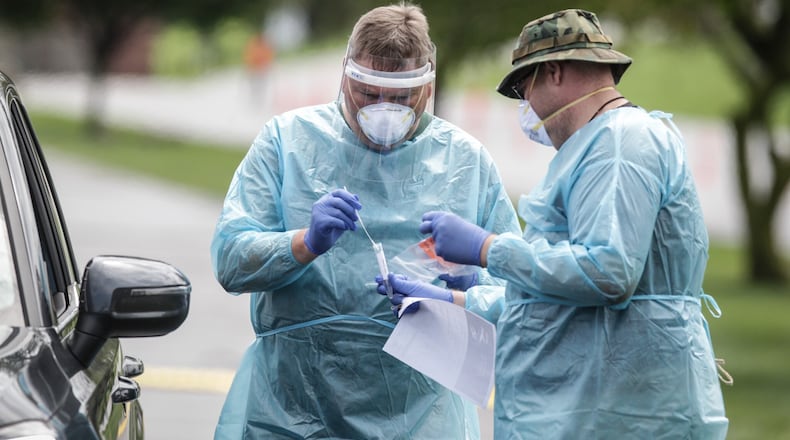ERs are already busy with COVID-19 patients, and hospital leaders have reported some people going to the ER solely for testing or for mild symptoms, when other settings would be faster and more appropriate care.
Here’s what you need to know about how and when to seek out a test, as well as the signs you might need emergency care.
Where to get testing
While the tents have been taken down at the original big testing sites, there are many options to get COVID-19 testing in the region, some of the options including:
- Premier Health and CompuNet Clinical Laboratories have six appointment-only testing sites in southwest Ohio, including Beavercreek, Cincinnati, Middletown, Springfield, Troy and West Chester Twp. Details and online appointment scheduling can be found by going to PremierHealth.com/coronavirus and clicking on COVID-19 Testing Sites: Schedule Now.
- For a test without an appointment, Premier and CompuNet have a testing site OnMain 1229 S. Main St., Dayton, 9 a.m. - 1 p.m. Monday to Friday.
- At the sites by Premier and CompuNet, a physician’s order is required, or if you do not have a physician’s order, they do self-pay tests for $100 for a PCR test and $60 for antigen or “rapid” tests.
- Kettering Health has testing by appointment and physician order at on-demand care sites, with scheduling at 937-558-3988 or ketteringhealth.org/coronavirus.
- The major pharmacy chains all have local COVID-19 testing sites. Rite Aid has drive through COVID-19 testing by appointment at many area pharmacies. Online scheduling is at riteaid.com. CVS also has online scheduling at cvs.com for COVID-19 testing at many area locations. Walgreens online scheduling is at walgreens.com.
Where not to get testing
If you just need a test or have mild symptoms, doctors are asking patients to avoid the ER. Seeking care in another setting will help reduce emergency care wait times when they are already busy with increased COVID-19 cases.
In west central Ohio, about 219 people were hospitalized in in-patient beds with COVID-19 as of Friday. A month ago, just 38 people in the region were. On top of that, more patients are coming to the ER with COVID-19, which is all adding on to other typical emergencies.
Dr. Roberto Colón, chief medical officer at Miami Valley Hospital, said everyone at the emergency department will always be treated.
“Just realize that if you happen to be there for just a test, you may have a longer wait than normal because of the volume of patients that everybody has been seeing right now,” Colón said.
By getting testing at a testing site, you’ll also help protect people in the ER from a potential COVID-19 exposure.
When you have mild symptoms
Most people who are infected with the coronavirus have mild symptoms that can be managed at home.
“For individuals that have very mild symptoms, or were just worried that they may have had contact with somebody and need to get a COVID test, there are many other alternatives that are also available, things like primary care offices, urgent cares for Premier that are all over the area, as well as our numerous testing locations,” Colón said.
Everyone’s circumstances are different and a primary care provider is a good resource to talk to the specifics of your risks, exposure, and symptoms. If you have insurance, your insurance company might also have a free 24-hour nurse advice line.
When it could be an emergency
Colón said some of the signs that should prompt you to go to the ER is chest pain, difficulty staying hydrated and an inability to keep fluids down, difficulty breathing, or any other symptoms that seem life threatening.
When to get testing
Dr. Patrick Lytle, Kettering Health vice president for clinic outcomes, said the first thing to consider is exposure. If a person has been exposed to someone with COVID-19 in a significant way, such as having a long unmasked lunch with someone and who in the next day or two learns they have COVID-19, the exposed person should monitor their symptoms.
Some symptoms that are a sign of COVID-19 are loss of taste or smell, coughing, or shortness of breath.
Lytle said there’s some difference in opinion on when to get tested, but he recommends testing if it will change your course of treatment.
“If I’m running fevers, I’m around other people that should know whether I do have COVID or not, that’s when I would be tested,” Lytle said.
He said there are options like monoclonal antibodies for qualifying patients with COVID-19 referred by a physician, like a non-hospitalized patient with obesity or diabetes.
Vaccination urged
Physicians urged people who are not vaccinated to get vaccinated. Lytle said people who are at higher risk for severe disease from COVID-19, such as people with obesity or other risk factors, should consider vaccination.
“If you haven’t been vaccinated, I would strongly encourage you to consider getting vaccinated and have a good conversation with your primary care doctor,” Lytle said.
About the Author

